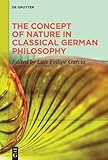The Concept of Nature in Classical German Philosophy / ed. by Luis Fellipe Garcia.
Material type: TextPublisher: Berlin ; Boston : De Gruyter, [2024]Copyright date: 2025Description: 1 online resource (VI, 299 p.)Content type:
TextPublisher: Berlin ; Boston : De Gruyter, [2024]Copyright date: 2025Description: 1 online resource (VI, 299 p.)Content type: - 9783111002392
- 9783111003498
- 9783111002453
- 193
- online - DeGruyter
- Issued also in print.
| Item type | Current library | Call number | URL | Status | Notes | Barcode | |
|---|---|---|---|---|---|---|---|
 eBook
eBook
|
Biblioteca "Angelicum" Pont. Univ. S.Tommaso d'Aquino Nuvola online | online - DeGruyter (Browse shelf(Opens below)) | Online access | Not for loan (Accesso limitato) | Accesso per gli utenti autorizzati / Access for authorized users | (dgr)9783111002453 |
Frontmatter -- Table of Contents -- 1 Introduction: The Resurgence of Classical German Natural Philosophy -- Part I Visions of Nature -- 2 Three Visions of Nature for German Idealism: Kant, Herder, Goethe -- 3 Nature as a “You”: Novalis’s Philosophical Extension of Fichte -- 4 Schelling on Comprehending Nature as an Absolute Activity: From Intellectual Intuition to Ecstasy of Reason -- 5 Hegel and the Rationality of Nature -- 6 Ludwig Feuerbach’s Ecological Humanism -- Part II Inorganic Nature -- 7 Kant’s Concept of Force and its Application in Physics and Psychology -- 8 From Kant to Schelling: Metaphysics of Nature and the Rise of Modern Science -- 9 Goethe’s Rational Empiricism -- 10 Hegel’s Concept of Inorganic Nature as Umwelt -- Part III Organic Nature -- 11 Nature versus Life: Dialectics and Physiology in Schelling -- 12 Anatomopathology of Reason: Bichat’s Legacy in Hegel’s Philosophy -- 13 The Emergence of Sentience: Hegel’s Conception of Animals -- 14 Great Chains of Being in Schelling’s Würzburg System -- 15 In What Sense is Nature a Scale of Degrees? Schelling and Hegel on “Degrees” in Nature -- Index of Names -- Index of Subjects
restricted access online access with authorization star
http://purl.org/coar/access_right/c_16ec
Classical German Philosophy has traditionally been understood as the period in the history of ideas in which the investigation of the human mind takes precedence over the investigation of the natural world. This assessment has a twofold consequence. On the one hand, the philosophy of the period has been praised for its contributions to our understanding of multiple expressions of human rationality such as history, art, and religion. On the other hand, such a philosophy has been criticized for its obscure speculations alien to the standards of modern scientific cognition. The philosophy of nature developed at the time has been accordingly dismissed as a piece of outdated metaphysics. Challenging this view, the contributions collected in this book argue for the historical and contemporary relevance of the approaches to nature formulated at the time.
Issued also in print.
Mode of access: Internet via World Wide Web.
In English.
Description based on online resource; title from PDF title page (publisher's Web site, viewed 20. Nov 2024)


